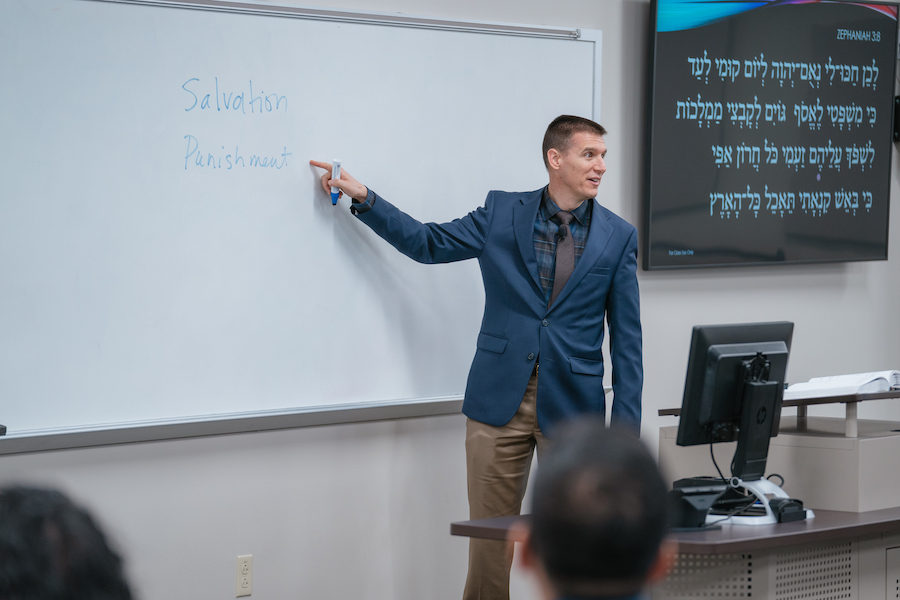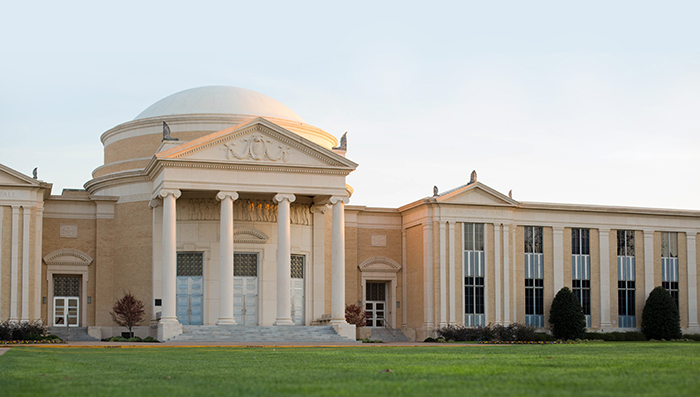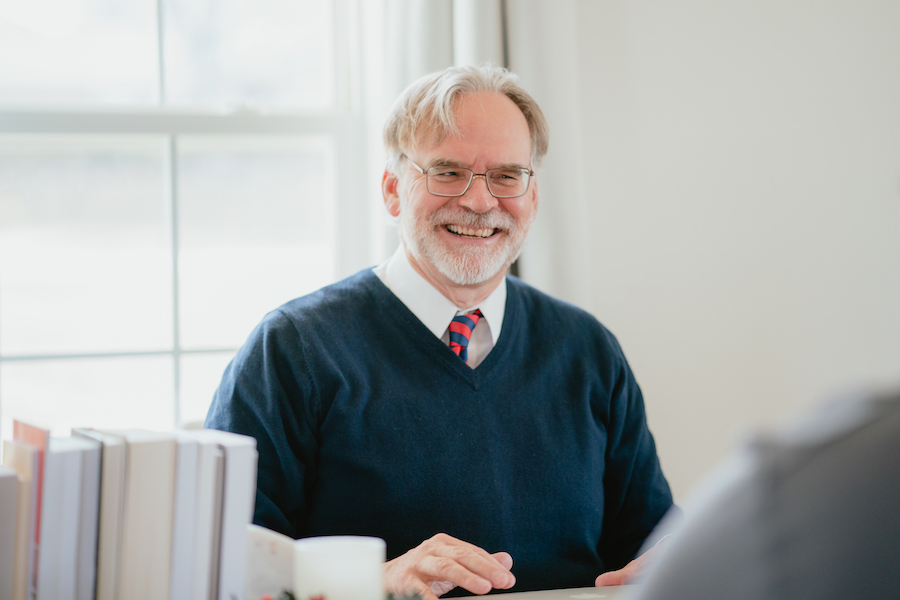Kim is a role model, father figure to his students
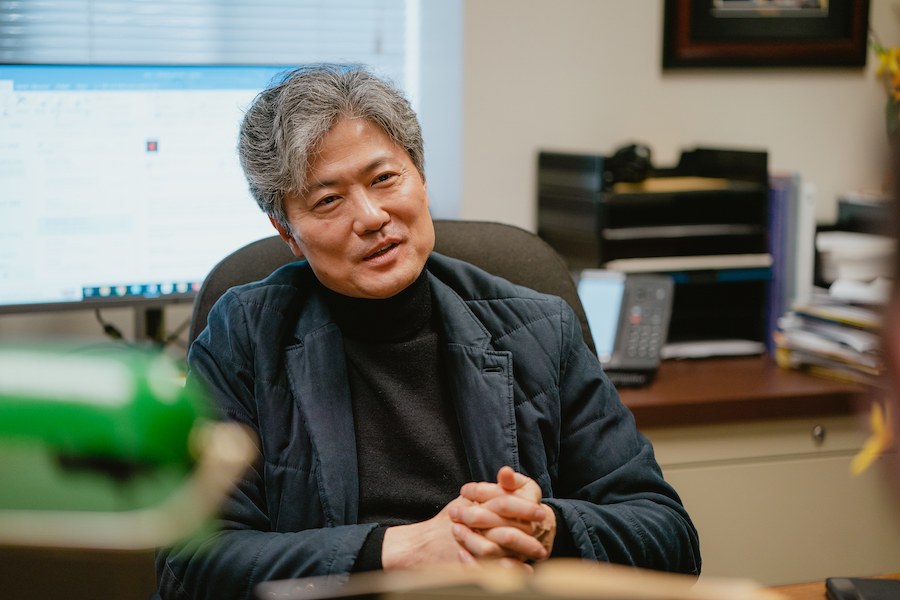
Jeremiah Kim is an associate professor of theology in the School of Theology at Southwestern Baptist Theological Seminary. He also serves as director of the seminary’s Korean Doctor of Ministry (D.Min.) program.
But students in his Korean D.Min. program see him as so much more.
“He’s not just a … professor, but at the same time, he is like a father, really taking care of … all the students with a father’s heart,” said David Kim, a spring 2024 graduate of Southwestern Seminary who serves as a pastor at One Church in North Richland Hills, Texas. The professor gives his students the eschatology and what they need to do as pastors, he said, but always emphasizes the church and the community perspective. He will “input it into … the students’ heart to know,” Kim said.
Joshua Pak said he has had “the privilege of studying under Professor Kim for the past six years. I consider Dr. Kim not just as my professor, but a personal mentor and a role model to emulate.”
Pak serves as senior pastor at Alaska Oriental Mission Church in Anchorage, Alaska, and said Kim “has not only deepened my understanding of theology but has also inspired a genuine love for Jesus and church. His impact extends beyond the classroom, shaping not just knowledgeable pastors and scholars but thoughtful individuals ready to contribute meaningfully to church and the Christian community.”
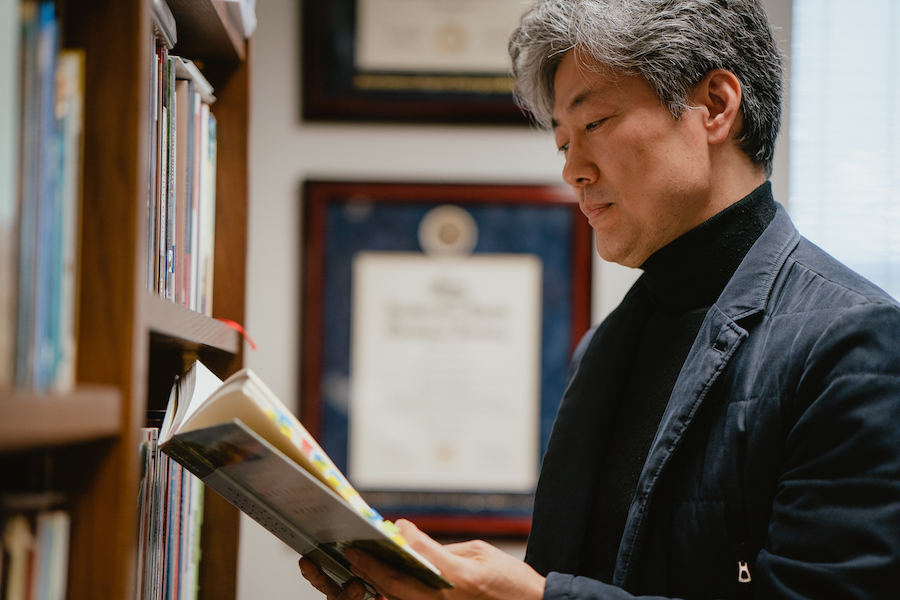
Jeremiah Kim, associate professor of theology in the School of Theology at Southwestern Baptist Theological Seminary and director of the seminary’s Korean Doctor of Ministry (D.Min.) program, is seen as a father figure and mentor by his students as he teaches them in the classroom and cares for them as they are at the Fort Worth seminary for training for ministry service.
On a personal level, Pak noted Kim’s caring and empathy for his students.
“Whenever a student is faced with life difficulties, he would ask the classmates to pray together and go extra miles to help,” Pak said.
Hyewon Kim called the professor “a gifted teacher as well as a brilliant scholar. … What I like the most about him is that he is a man of integrity, who loves Christ and His church dearly. I think that his love and passion for Christ and especially for His church are so inspirational and contagious that his students and people around him also get truly committed to and love them.”
The professor said his path to faith was not an easy one.
Kim was born and grew up in South Korea. Despite being a pastor’s son, he said, “I never had the personal experience.”
He came to the United States at age 18 and said his salvation experience came a year or two later.
Kim had settled in Southern California and was working the night shift at a convenience store. He “had tons of time to kill, so I decided to just read the Bible, from Genesis to Revelation,” he explained. Though he’d previously read portions of the Bible, he said, he’d never read the entire book at one time.
“So I just kept reading, reading, and then God touched my heart and everything I [heard] from my childhood came together, and I realized that God is real, and then Jesus died for me,” he said. “So I knelt down and [accepted] Jesus Christ as my personal Lord and Savior.”

A native of South Korea, Kim was raised as a pastor’s son but did not come to faith in Christ until he was in his late teens and living in the United States. A veteran of the United States Army, Kim was called to vocational ministry on Easter Sunday as he was serving in Saudi Arabia.
He continued to struggle, though, and decided to join the Army. He was reading a lot of philosophy books, one of which said, “If you face the extreme condition, you will find out who you really are.” Kim said he joined the Army because it was the only place he knew of where he could face an extreme condition.
Kim served four years in the Army, “but I never met myself like that. I met my wife,” he said with a laugh.
He and Mi-Hee married, then he was discharged from the Army and worked to start his own business. A year later, he received a letter from the U.S. government stating that his unit was being remobilized for the Gulf War. He was ordered to report or face jail time.
“So it just ruined my entire life,” he said, adding he prayed “really hard” to God that he wouldn’t be sent to the front line. Kim arrived at his station the day before the ground war started and learned that his unit was going to charge Baghdad.
“So I thought, ‘God [is] going to kill me, punish me,’” he said, adding he kept asking God why He was deserting him.
“But the war just ended really easy,” he said. “And then I didn’t get hurt. … Thank God I didn’t have to kill anyone.”
He rejoined his company in Saudi Arabia, and the chaplain sent word there would be an early morning service for Easter Sunday.
“And this is Saudi Arabia; that’s a land of the Muslim, Islam,” Kim said, adding that in regular circumstances, “you never [worshipped] God openly.”
As he approached the place where the service would be held, he saw that someone had made a cross out of two pieces of wood. He said God showed him two visions at the same scene: the crude cross like the one where Jesus was crucified, and the victorious cross – “the eschatological cross.” He knew then that God was calling him to ministry.
“I knelt down and I wept,” he said. “And then I just [surrendered] myself to His calling,” Kim said.
When he returned to the United States, however, “I changed my mind, [or] maybe … I was just too emotional. I don’t like church, I don’t like people,” he said, adding he didn’t believe that God would call him to ministry.
Kim said he resisted God’s calling for a couple of years and tried to build a business and make money.
“I [made] money,” he said, “but … I lost my happiness. And I tortured, not literally, but, my wife. So all the relationships around me … [were] getting broken.”
He made a deal with God: he would keep his job and return to college. If he earned an undergraduate degree, Kim said, he would go to seminary.
“And He gave me the joy of learning,” Kim said.
He graduated with a Bachelor of Arts in theology at San Diego International Biblical College and Seminary, then went on to earn a Master of Divinity at Golden Gate Baptist Theological Seminary (now Gateway Seminary in Ontario, California). He came to Southwestern in 2000 for his Master of Theology degree and also earned his Doctor of Philosophy degree from SWBTS.
Kim said he runs Southwestern’s D.Min program differently than other schools.
“Usually, the Doctor of Ministry program is where you teach the new ministry skills and practical knowledge and equip pastors as a leader,” he said, but added that he teaches mostly theologies.
Kim said what a Korean pastor needs most is the “right evangelical conservative theology,” adding their “negative attitude toward the theology is what harms the church most. So I try to teach them why we serve [the] church, what is church, and I try to tell them church is larger than your life. … I try to have my Korean pastors rededicate themselves to [the] church.”
Pastors must continue their education, Kim said, adding that not doing so is not good for the church. Some pastors “thought they are being educated because they kept reading the commentaries and all the books for, to prepare their sermons,” he said. “But that’s not the education. Education is to stretch out your perspective. … So that’s what the D.Min. is for – to challenge them and then just extend their perspective.”
